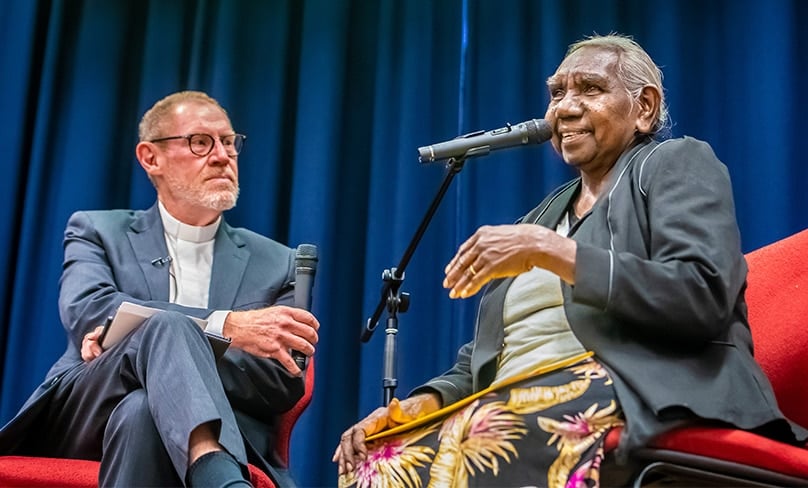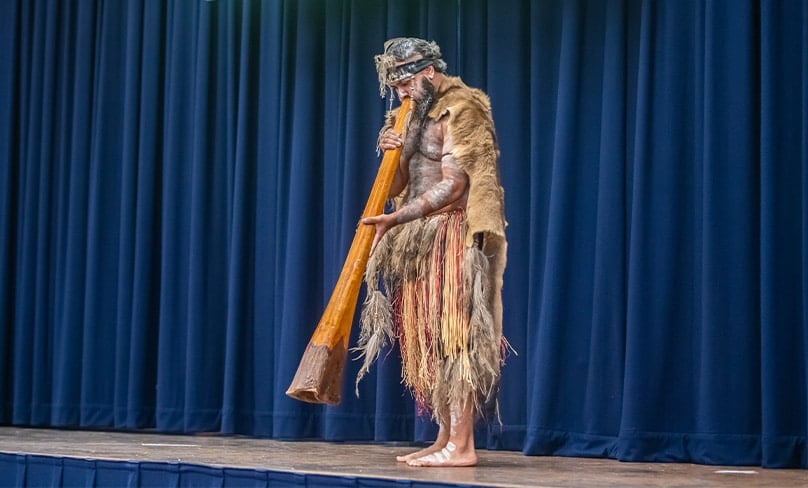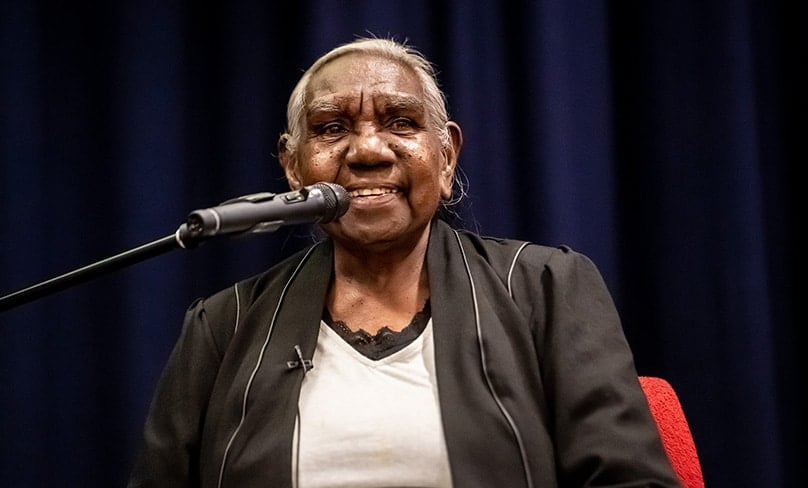
Dr Miriam Rose Ungunmerr-Baumann is a remarkable figure. Speaking in Sydney recently, she urged fellow Catholics to learn about Indigenous peoples and begin the journey of walking forward together
Catholic Aboriginal elder, educator and artist Dr Miriam Rose Ungunmerr-Baumann has called on Sydney’s Catholic community to engage in reconciliation with Australia’s Indigenous peoples, first by learning about them and listening to their stories.
“People ask me, how do we work with the First Nations people? And I tell them, you have got kids in your schools all around Australia, start there, and invite their families to get involved as well,” she said.
“I suggest they learn about the country their schools and parishes are on.
“Find out what language group it is and learn about them, sit down and listen to each other.
“I ask you to act as an ambassador, to continue this journey of walking together and deeply listening to each other, so that all Australians feel heard and understood. And through this, true reconciliation can occur.”
Dr Ungunmerr-Baumann made her comments at an evening on Aboriginal Catholics and Reconciliation hosted by the Archdiocese of Sydney’s Justice and Peace Office at St Mary’s Cathedral College Hall on 7 October.
“The biggest gift the nuns who educated me gave me was to tell me, ‘You have got to learn to walk in two worlds’ and this has influenced my work ever since.”
The youth advocate was the first ever-Indigenous teacher in the Northern Territory and has dedicated her life to helping young Australians “walk in both worlds” as she does.
A Member of the Order of Australia, in 2021 she was named the senior Australian of the Year.
Last month Dr Ungunmerr-Baumann was one of the 10 Australians invited to attend Queen Elizabeth’s funeral and this month she was awarded an honorary doctorate from Australian Catholic University.
“The biggest gift the nuns who educated me gave me was to tell me, ‘You have got to learn to walk in two worlds’ and this has influenced my work ever since,” she said.
“Teaching has given me the opportunity to teach the kids in my community our culture but has also given me the opportunity to teach kids around Australia about us, our culture, our ways and our spirituality.”
This year following the Plenary Council, the Catholic Church in Australia voted to officially endorse the Uluru Statement from the Heart, which calls for a First Nations voice to Parliament to be enshrined in the Constitution.

The Federal Government is currently planning a referendum on the issue.
Justice and Peace promoter for the Archdiocese of Sydney Fr Peter Smith said he appreciated the support of Archbishop Anthony Fisher OP in recognising the need for the archdiocese to embark on the path of reconciliation. He said it was a very important moment for the nation.
“This is a time that I think our Indigenous sisters and brothers have waited for a long time, it’s also a time that many of us … have also waited for, hoped for and prayed for a long time, that we can build reconciliation in this nation.
“The wisdom that Miriam Rose has offered to our whole nation gives us hope for the future.”
The archdiocese will formalise its commitment to reconciliation with the country’s Aboriginal and Torres Strait Islander peoples, with the first stage of a Reconciliation Action Plan recently accepted by peak body Reconciliation Australia.
Partners will include Aboriginal elders, the Aboriginal Catholic Ministry, the Justice and Peace Office, Archdiocesan agencies and Sydney Catholic Schools.
“Dadirri recognises the deep spring that is inside us. We call on it and it calls to us. This is the gift that Australia is thirsting for.”
Dr Ungunmerr-Baumann said that she welcomed anyone who wanted to come to visit her community on the Daly River in the Northern Territory, which is home to 10 language groups and 500 people.
“I believe the most important quality of our people and our most unique gift, which is perhaps the most important gift we can give to Australians is called Dadirri,” she said.
“It is inner, deep listening, and quiet, still awareness.
“Dadirri recognises the deep spring that is inside us. We call on it and it calls to us. This is the gift that Australia is thirsting for.
“It is sometimes like what you call contemplation … There’s no need of words, a big part of Dadirri is listening.
“The contemplative way of Dadirri spreads over our whole life, it renews us and brings us peace, and makes us feel whole again.

“In our Aboriginal way we learn to listen from our earliest days, we could not live good and useful lives unless we listen. It’s the normal way for us to learn.
“Our culture is different. We are asking our fellow Australians to get to know us, to be still and to listen to us.
“If our culture is alive and strong and respected it will grow, it will not die, and our spirit will not die.
“And I believe that the spirit of Dadirri we have to offer will blossom and grow, not just within ourselves but our whole nation.
“In my acceptance speech last year I asked my fellow Australians to walk alongside us, and support and understand but it begins as simply as sitting down with us and leaning from each other and where we all come from.
“It’s important for the people of Australia to understand that now is the right time for all of us to do our part for reconciliation.”
